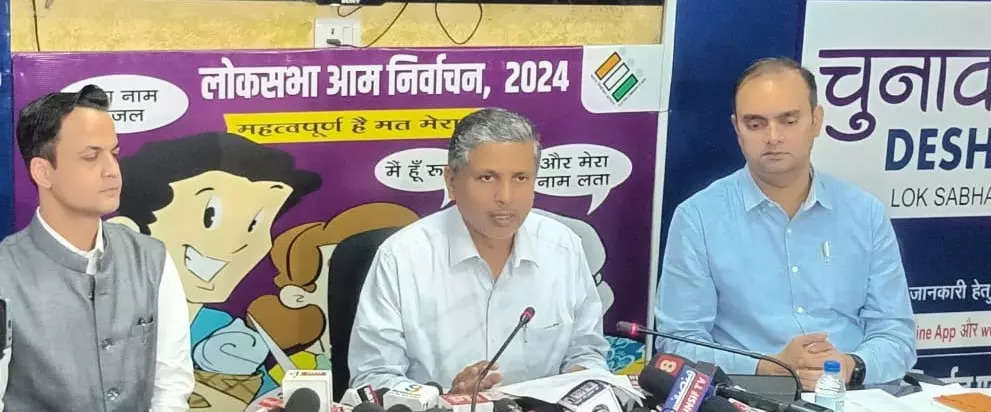[ad_1]
PATNA: The parliamentary elections in Bihar will be held in seven phases spreading over 43 days, beginning April 19 and ending on June 1, the Election Commission announced on Saturday, suddenly heating up the poll scene in the state having a total of 40 LS seats. With the announcement of the poll schedule, the model code of conduct has now immediately come into force.
In the first two phases, districts identified as “Maoists-affected” and those located along the eastern border with significant Muslim population will go to polls. The four LS constituencies which go to polls in the first phase include Aurangabad, Gaya, Nawada and Jamui—the constituencies which reported a large number of Maoist violence in the 90’s. The Maoist incidents, though, have drastically come down in recent years and the areas remain relatively peaceful. Two of the four constituencies are reserved for Scheduled Castes.
The five districts which go to poll in the second phase—Kishanganj, Katihar, Purnia, Bhagalpur and Banka— hold strategic importance since they are located in the eastern region having a significant Muslim population. As per 2011 census, Muslims constitute some 68 per cent of the total population in Kishanganj and are in majority there.
Similarly, five constituencies each will go for voting in the third, fourth and fifth phase of the elections while in the remaining two phases, elections will be held in eight parliamentary constituencies each.
A significant feature of the poll schedule is that the two parliamentary constituencies located in Patna district—Patna Sahib and Patliputra—will go to polls in the last and the seventh phase, along with Nalanda, once the home constituency of CM Nitish Kumar, Ara (represented by Union minister Raj Kumar Singh), Buxur (represented by another Union minister Ashwini Kumar Choubey), Sasaram, Karakat and Jehanabad.
Very interestingly, the phase-wise listing of Lok Sabha constituencies for polling remains similar to the 2019 poll schedule, the only difference being the dates of polling. “Conducting elections in seven phases was not required. Maybe the EC doesn’t want to take any risk given the past image of Bihar,” political analyst Prof Nawal Kishore Choudhary said, asking the people to trust institutions. “The EC has done admirably well,” he said.
Chief Electoral Officer, Bihar, HR Srinivasa said they are committed to conducting free and fair polling in the state. “We have identified 35 expenditure sensitive assembly constituencies falling under 18 parliamentary constituencies out of total 40 LS seats in the state,” the CEO told a media conference in Patna on Saturday, adding they were also constituting three flying squads in each assembly constituency to act against the cases of model code violations.
The CEO added that they have begun removing posters, banners, flags and wall writings from the govt buildings now with the model code of conduct coming into force and in the next 48 hours, all such graffiti, flags and posters of the political parties would be removed from all private buildings too.
He also said increasing the poll percentage in the state was the poll panel’s challenge. “Until the people come out of their homes and take part in the voting process, democracy will not strengthen,” Srinivasa said.
In the first two phases, districts identified as “Maoists-affected” and those located along the eastern border with significant Muslim population will go to polls. The four LS constituencies which go to polls in the first phase include Aurangabad, Gaya, Nawada and Jamui—the constituencies which reported a large number of Maoist violence in the 90’s. The Maoist incidents, though, have drastically come down in recent years and the areas remain relatively peaceful. Two of the four constituencies are reserved for Scheduled Castes.
The five districts which go to poll in the second phase—Kishanganj, Katihar, Purnia, Bhagalpur and Banka— hold strategic importance since they are located in the eastern region having a significant Muslim population. As per 2011 census, Muslims constitute some 68 per cent of the total population in Kishanganj and are in majority there.
Similarly, five constituencies each will go for voting in the third, fourth and fifth phase of the elections while in the remaining two phases, elections will be held in eight parliamentary constituencies each.
A significant feature of the poll schedule is that the two parliamentary constituencies located in Patna district—Patna Sahib and Patliputra—will go to polls in the last and the seventh phase, along with Nalanda, once the home constituency of CM Nitish Kumar, Ara (represented by Union minister Raj Kumar Singh), Buxur (represented by another Union minister Ashwini Kumar Choubey), Sasaram, Karakat and Jehanabad.
Very interestingly, the phase-wise listing of Lok Sabha constituencies for polling remains similar to the 2019 poll schedule, the only difference being the dates of polling. “Conducting elections in seven phases was not required. Maybe the EC doesn’t want to take any risk given the past image of Bihar,” political analyst Prof Nawal Kishore Choudhary said, asking the people to trust institutions. “The EC has done admirably well,” he said.
Chief Electoral Officer, Bihar, HR Srinivasa said they are committed to conducting free and fair polling in the state. “We have identified 35 expenditure sensitive assembly constituencies falling under 18 parliamentary constituencies out of total 40 LS seats in the state,” the CEO told a media conference in Patna on Saturday, adding they were also constituting three flying squads in each assembly constituency to act against the cases of model code violations.
The CEO added that they have begun removing posters, banners, flags and wall writings from the govt buildings now with the model code of conduct coming into force and in the next 48 hours, all such graffiti, flags and posters of the political parties would be removed from all private buildings too.
He also said increasing the poll percentage in the state was the poll panel’s challenge. “Until the people come out of their homes and take part in the voting process, democracy will not strengthen,” Srinivasa said.
[ad_2]
Source link


